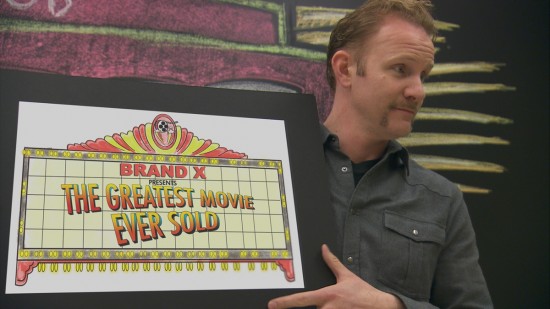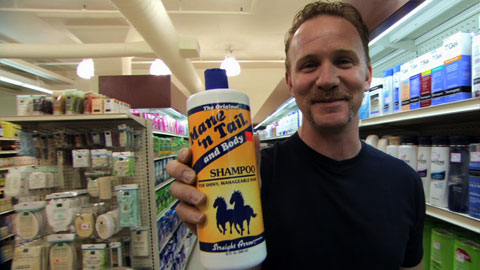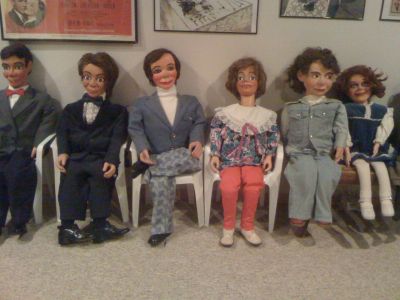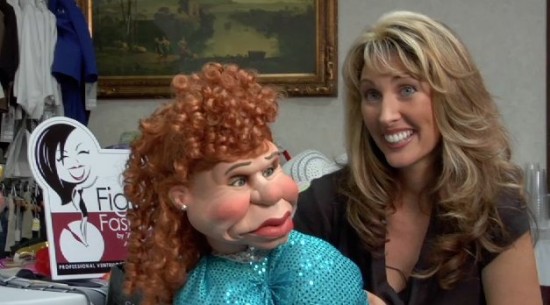Fri 22 Apr 2011
Mad Man
Posted by Ethan under Film Review, NYC Film Critic
Comments Off on Mad Man
POM Wonderful Presents The Greatest Movie Ever Sold
Directed by Morgan Spurlock
**1/2
Perhaps befitting Morgan Spurlock’s self-stated desire to make “the blockbuster of documentaries,†POM Wonderful Presents The Greatest Movie Ever Sold is the Super Size Me director’s most high-concept film to date. As he regularly reminds us during the course of the movie, Spurlock has made a film about advertising that’s been paid for entirely by advertisers.
This conceit is summed up by the first three words of the film’s title—POM Wonderful, maker of America’s Favorite Pomegranate JuiceTM, paid Spurlock for that prominent billing. The company also forked over a big chunk of change to be the movie’s “official beverage,†which means the only thing that Spurlock and the various talking heads he interviews quaff on camera are bottles of POM Wonderful. (To drive the gag home further, whenever the director—who, as usual, is also the movie’s star—wanders into a store, the labels of the non-POM beverages are blurred out.)
Other brands that paid Spurlock for the privilege of advertising in his feature-length stunt include Jet Blue (official airline of The Greatest Movie Ever Sold), Hyatt (official hotel chain of The Greatest Movie Ever Sold), Ban (official deodorant of The Greatest Movie Ever Sold), Amy’s Kitchen (official frozen pizza of The Greatest Movie Ever Sold) and, last but certainly not least, Mane ‘n Tail (official human-and-horse shampoo of…well, you know). The film itself consists of the always-personable Spurlock pitching his oh-so-meta premise to baffled ad executives, talking with such vocal critics of commercialism as Ralph Nader and Noam Chomsky and touching on bigger issues like product placement in movies (a section that features cameos from such big-name directors as Peter Berg, J.J. Abrams and Brett Ratner), advertising in public spaces and whether Mane ‘n Tail really leaves human hair as soft and luxurious as equine hair. Every now and then the director also pauses to ask himself whether he’s sold out by accepting money from advertisers, thus becoming part of the problem rather than the solution.
The answer to this soul-searching questions of course, is yes and Spurlock is at least self-aware enough to own up to the compromises he’s had to accept by choosing to make the movie this way. In its most effective moments, The Greatest Movie Ever Sold uses its limitations as fodder for clever commentary. One of the movie’s best scenes, for example, grew out of a contractual obligation to include a 30-second commercial for POM Wonderful within the movie. After shooting down all of his ideas for the spot (which, to be honest, are pretty lame), POM’s executive suggest that he focus on telling viewers why its juice is superior to the competition. Midway through the movie, we get a glossy clip of Spurlock walking through a grocery store explaining the general importance of reading food labels as part of a larger argument he’s been making about how ads are designed to make us forget about things like nutritional value. He picks up a carton of Minute Maid-brand pomegranate juice and calls our attention to how little actual pomegranate is actually contained in the product. Then he thrusts a bottle of POM Wonderful in the camera and extols its many virtues, like the fact that it’s made from 100% pomegranate juice unlike those other brands. In a swift thirty seconds, Spurlock has managed to stage an effective scene that underlines a serious point about advertising, while also fulfilling his duties as a POM pitchman. Check and mate.
Spurlock is a smart, funny guy by nature, so it’s no surprise that The Greatest Movie Ever Sold offers a number of smart, funny scenes like this one. In fact, this is probably his best-conceived and most purely entertaining feature since his breakthrough, Super Size Me. It’s certainly a significant improvement over his last two big-screen efforts, the painfully forced Where in the World is Osama Bin Laden? and his glib entry in the Freakonomics anthology documentary. (His FX series 30 Days remains the best thing he’s done to date.) Ultimately though, I think that Spurlock may have outsmarted himself. Simply making the audience aware that we’re being advertised to for 88 minutes doesn’t change the fact that…we’re being advertised to for 88 minutes! (That Spurlock’s camera lingers so lovingly on all the free swag he scores just makes us desire those products more.)
Beyond that, the film has little new to say about its subject; no doubt to avoid any potential lawsuits, Spurlock refrains from investigating or challenging the advertising practices of his various sponsors. Meanwhile, the broader implications of our ad-saturated culture are explored in only cursory detail, as the director hits the major bullet points of topics like product placement without investigating them in any real depth. Indeed, the entire movie is about as superficial as your average commercial, which is almost certainly intentional on Spurlock’s part. He’s adopted the tools of the advertising trade to comment on said trade, a trick that’s only successful until you realize that the movie you’re watching is just another substance-free trailer for a product you don’t really need. I’ll give Spurlock this though—the first thing I drank after coming out of The Greatest Movie Ever Sold was a small bottle of POM Wonderful. And you know what? It was pretty darn good.
POM Wonderful Presents The Greatest Movie Ever Sold opens in limited release today.
———————————————————————————————————————————————————————
Dumbstruck
Directed by Mark Goffman
***
I’m not entirely certain what I was expecting when I sat down to watch Dumbstruck, Mark Goffman’s documentary about five ventriloquists and their attempts to make a professional career out of talking to—and through—puppets. Would it be a sniggering Trekkies-style profile of a bunch of obviously dorky and deluded souls? Or would Goffman take the Spellbound approach and structure the whole film around some big competition that’s unknown to the world at large but a major deal within the ventriloquist community? As it turns out though, Dumbstruck is something else entirely—a grounded, sometimes painfully honest look at a group of people dedicating themselves to a profession that the rest of the world doesn’t completely understand. In that way, it’s not entirely dissimilar from Darren Aronofsky’s Black Swan. Okay, so in terms of their formal qualities the two movies are nothing alike. But both do largely concern themselves with depicting what artists sacrifice in pursuit of their art.
And make no mistake the five people profiled in Dumbstruck have made some big sacrifices. Take veteran ventriloquist Dan Horn, who makes the bulk of his income working the lucrative, but demanding cruise ship circuit. Because he’s always on the road, he and his wife of over twenty years have been steadily growing apart and, by the end of the movie, it appears that their separation may become permanent. Former beauty pageant queen Kim Yeager’s career ambitions have also taken a toll on her love life; she broke up with her fiancé when he grew tired of competing with her beloved crew of puppets. And at only 13, ventriloquist-in-training Dylan Burdette has grown accustomed to the strange looks he gets from friends and some family members, most notably his dad, who openly wishes his son was into more “normal†hobbies like dirt bike racing.
But hands down the saddest story belongs to Wilma Swartz, a passionate puppeteer just barely scraping by performing sparsely attended gigs at retirement communities. It’s strongly alluded to—but never stated directly—that Wilma began her life as a man before becoming the lady she is today and that choice cost her her entire family, including her young son. Although she’s managed to find acceptance and love within the ventriloquism community, she still tears up whenever she thinks of the boy she hasn’t seen in years. (In a scene that demands a follow-up question or two, she reveals that her ex-wife told their child that Wilma was dead to prevent him from looking for her. When he did anyway, her relatives compounded the lie by saying she had been cremated. For whatever reason, Wilma has declined to get in touch with her son to set the record straight.)
So why do these folks continue to pursue such a difficult and emotionally draining dream? Well, they love the thrill of performing first and foremost, but each of them also hopes to be the one ventriloquist in a million that breaks out and becomes a star. That rare success story is embodied in the film by Terry Fator; once upon a time, this jovial fortysomething was in the same position as the other four subjects—pouring his heart into performing, struggling to make ends meet and nursing some private pain, specifically his father’s abject disinterest in his career path. But then Fator tried out for the reality series America’s Got Talent and went on to win the entire competition. That led to a successful tour followed by a headline show at Las Vegas’ Mirage Hotel, for which he earned a staggering $100 million payday. Interviewed after inking the deal, Fator seems barely able to believe his good fortune and makes a point of encouraging other ventriloquists to keep plugging away and not give up hope.
As a piece of filmmaking, there’s nothing particularly distinctive about Dumbstruck. Goffman alternates standard talking head interviews with clips from the five subjects’ performances and brief glimpses of their day-to-day lives. The movie’s main strength is its cast, all of whom are personable and enthusiastic about their profession without seeming completely naïve. To his credit, Goffman doesn’t take advantage of their optimism to ridicule them or inflate their expectations. It’s clear at the end of the film that none of the other four will be signing a $100 million contract like Terry Fator. Still, they’ll keep on taking the stage with puppets in hand because that’s what brings them some measure of happiness. And sometimes that’s all that matters.
Dumbstruck opens in New York today.
———————————————————————————————————————————————————————
Also in Theaters:
Legend of the Fist: The Return of Chen Zhen
Directed by Andrew Lau
Screenplay by Gordan Chan
Starring Donnie Yen, Shu Qi
**1/2
It’s no accident that much of the action in this Hong Kong-produced martial arts period piece—which is set between the two World Wars in 1920s Shanghai—takes place in and around a tony nightclub called “Casablanca.â€Â Look past star Donnie Yen’s lightning quick kung fu moves and you’ll see a movie that’s otherwise striving to be resolutely Old Hollywood. Legend of the Fist is the latest vehicle for the popular folk hero Chen Zhen, a character originated by Bruce Lee in the 1972 film Fist of Fury and who has since appeared numerous times on both the big and small screens, including a mid-‘90s TV series that gave Yen his first crack at the role. In this telling, Zhen is embedded deep within the Chinese resistance movement, which is looking for ways to undermine the increasing power of the Japanese army. To spy on the enemy, he takes a job as a piano player in the aforementioned nightclub, where he flirts with a lovely torch singer (Shu Qi) who also may be leading a secret double life. In another wrinkle on the standard Chen Zhen formula, Yen also occasionally dons a suit and mask and fights crime on the streets of Shanghai like some kind of ‘20s-era Batman. (Actually, his outfit bears a stronger resemblance to The Green Hornet’s Kato, an obvious nod to the screen icon that created both roles.) The script for Legend of the Fist is a lazy mishmash of clichés taken from a lot of World War II-era American movies, offering the same clear-cut good guy/bad guy characterizations, melodramatic flourishes and relentless jingoism. (The Japanese are referred to as “Japs†throughout and there’s a scene where a Chinese police officer tells off his British boss that must be sure-fire crowd-pleaser overseas.) But then, the main attraction here isn’t the story, it’s the action and on that front the movie mostly delivers. There’s a terrific opening pre-credits sequence in which Zhen single-handedly decimates a squad of German soldiers and Yen’s fluid, speedy fighting style yields some memorable ass-kicking moments . Too bad the film surrounding those fight scenes is there to be tolerated rather than fully enjoyed.





No Responses to “ Mad Man ”
Sorry, comments for this entry are closed at this time.